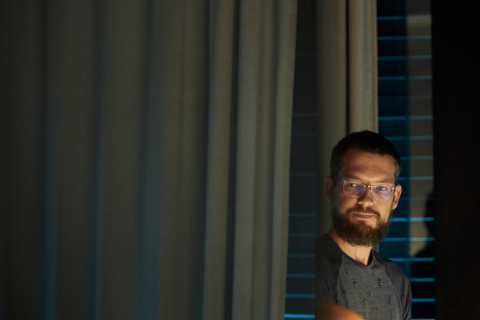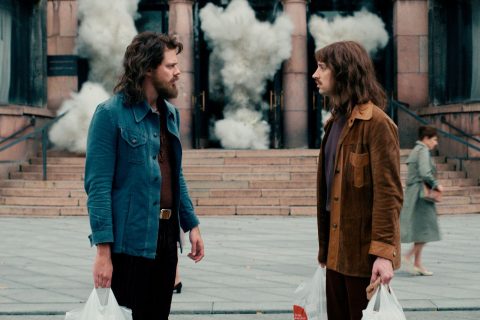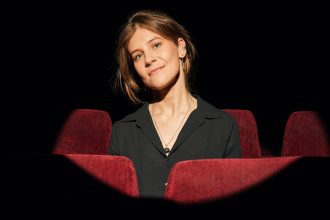“This is my house, but my mom lives in Kačerginė now. My grandparents lived next door, and their apartment is now rented by my childhood friend, who returned from France,” Saulė Bliuvaitė says introducing her former yard as we circle the school stadium. I contacted the press representative of the film Toxic for an interview with the film director before its world premiere at the Locarno Film Festival in Switzerland in August 2024.
As golden leopards began to pour into Saulė’s arms, I was happy with my intuition, and the Kaunas-born film director’s win prompted me to dedicate the entire issue of this magazine to childhood in Kaunas. I thought it was very symbolic to meet in Vilijampolė, between Varnių and Demokratų streets, where Saulė played football, attended school, and after hours would find her way to the swimming pool. After all, her first feature film is also about the vitality of adolescence; about the desire to fit in, excel, and break free at any cost.
Toxic will reach Lithuanian cinemas in March 2025, but for now, it continues to travel through international festivals, leaving no one indifferent. Lithuania’s cultural attaché in the USA, Gražina Michnevičiūtė, wrote after a screening at the New York Baltic Film Festival, “The audience’s emotions range from pain causing the heart to shrink to the size of an apple seed, to anger and inner identification. When an Asian girl leaving the hall said, “This is my lie,” I realized once again that Toxic opens everyone’s hearts regardless of country or continent.”
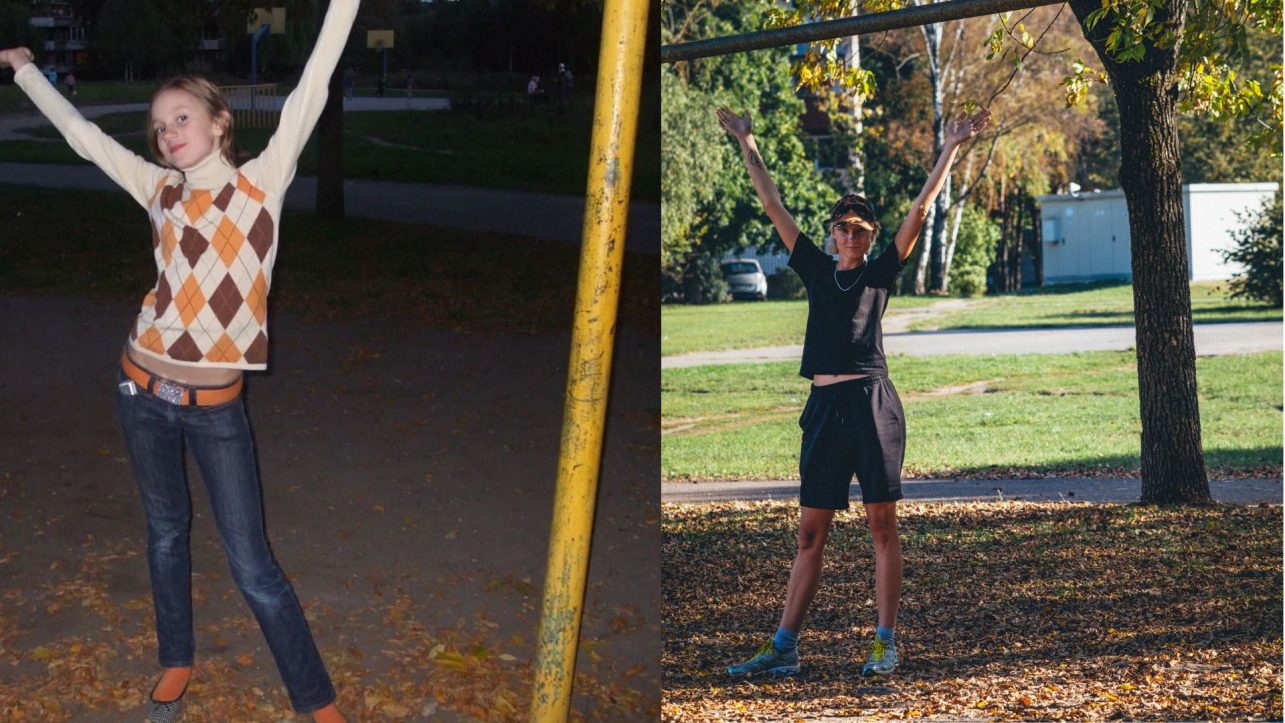
You know, I just realized that the old residential neighborhoods seem like a more attractive place to live than the new suburbs.
I think so too. Look, this is just incredibly cool: a stadium right in the courtyard. Parents and grandparents can look out from the balcony to check if the kids are still there. I didn’t go to kindergarten; by the time I was five, I was already playing there with other five-year-olds. By six, we were practically grown-ups. Now it’s strange to think how that was even possible. But that’s how the culture was back then. Everything here is familiar to me, every bush. My grandfather would tell me more about the trees. My friends and I basically destroyed them by climbing on them [laughs]. And we used to play football too – with the boys, I was about 12. I remember, at first, I was just a girl, but then I started playing better, and one day I scored a goal, and they just kicked me out.
How did your family end up in Vilijampolė?
Both grandparents came from the countryside and studied at the Agricultural Academy. They wanted to get married and start a family but were waiting for an apartment to be assigned. These apartment buildings were built around 1960, and they got lucky. Mom told me that Grandma came into the bathroom, sat down, and said, “I can’t believe I have my own bathroom.” Now that apartment seems so tiny, but for them, it was a big deal.
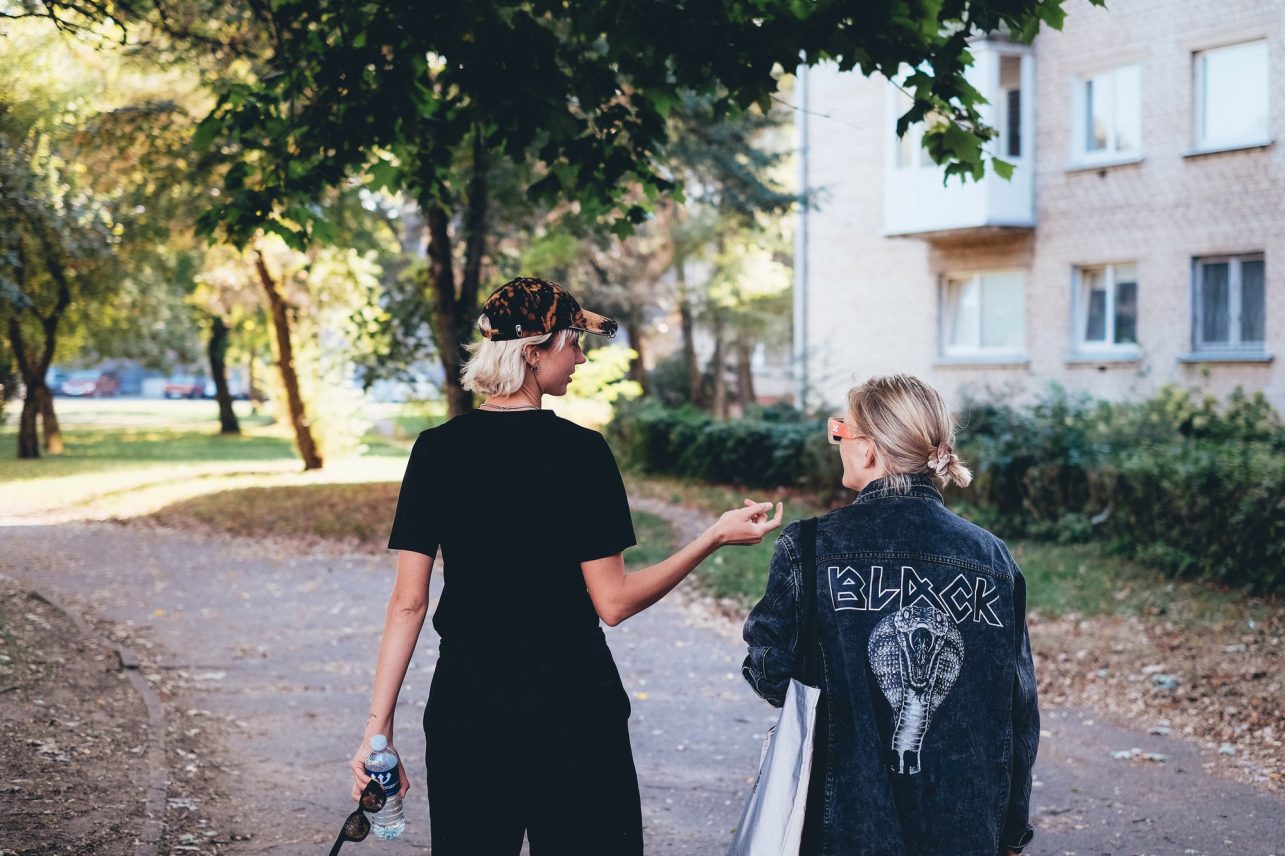
We are near the Jonas and Petras Vileišis school. Did you attend it?
Yes, until the eighth grade, when it was still called P. Vileišis High School. After that, I applied to KTU Gymnasium but wasn’t admitted, and then I transferred to Saulės Gymnasium. Actually, both my mom and dad went to the same school. My dad lived on Panerių Street. That is where they met and at some point, six people – including my great-grandmother and older sister – lived in my grandparents’ tiny apartment! Finally, they bought an apartment of their own in the same building.
We reached Demokratų Square. In October 1941, the Great Action began here, culminating in the massacre at the Ninth Fort in Kaunas. Coincidence or not, you co-wrote the screenplay for Jurgis Matulevičius’ film Isaac. The plot is inspired by the Lietūkis Garage Massacre that took place in the center of Kaunas. Growing up, were you aware of all this?
I only recently learned about what happened in Demokratų Square, specifically when the commemorative plaque was installed. Before that, I knew more about the old Vilijampolė, which was the main area of the Kaunas Ghetto. When we walked toward Sąjunga Square, my grandfather would tell me bits and pieces, but, of course, as a child, I didn’t really understand what the ghetto was.
Have you always loved cinema?
I just watched TV. My sister and I shared a room. If a film was rated +14, she would tell me to go to sleep. I’ve watched a lot of films in secret, on my knees, through the bed frame. My legs would get numb.
Maybe when I was twelve, my friends and I would go to rent films, or download them. But I never thought of becoming a filmmaker myself. Now, of course, I can say that I liked making silly films. I used to edit them with Windows Movie Maker, the most primitive program, which offered all sorts of funny transitions between shots, like, a leaf turning over [laughs]. I didn’t care much for the result, I just wanted to understand how things worked. My friends and I created all kinds of parodies, with no artistic pretensions, just mocking what was shown on TV. Like, a celebrity arrives at an apartment full of criminals, and there’s a corpse lying in a bag.
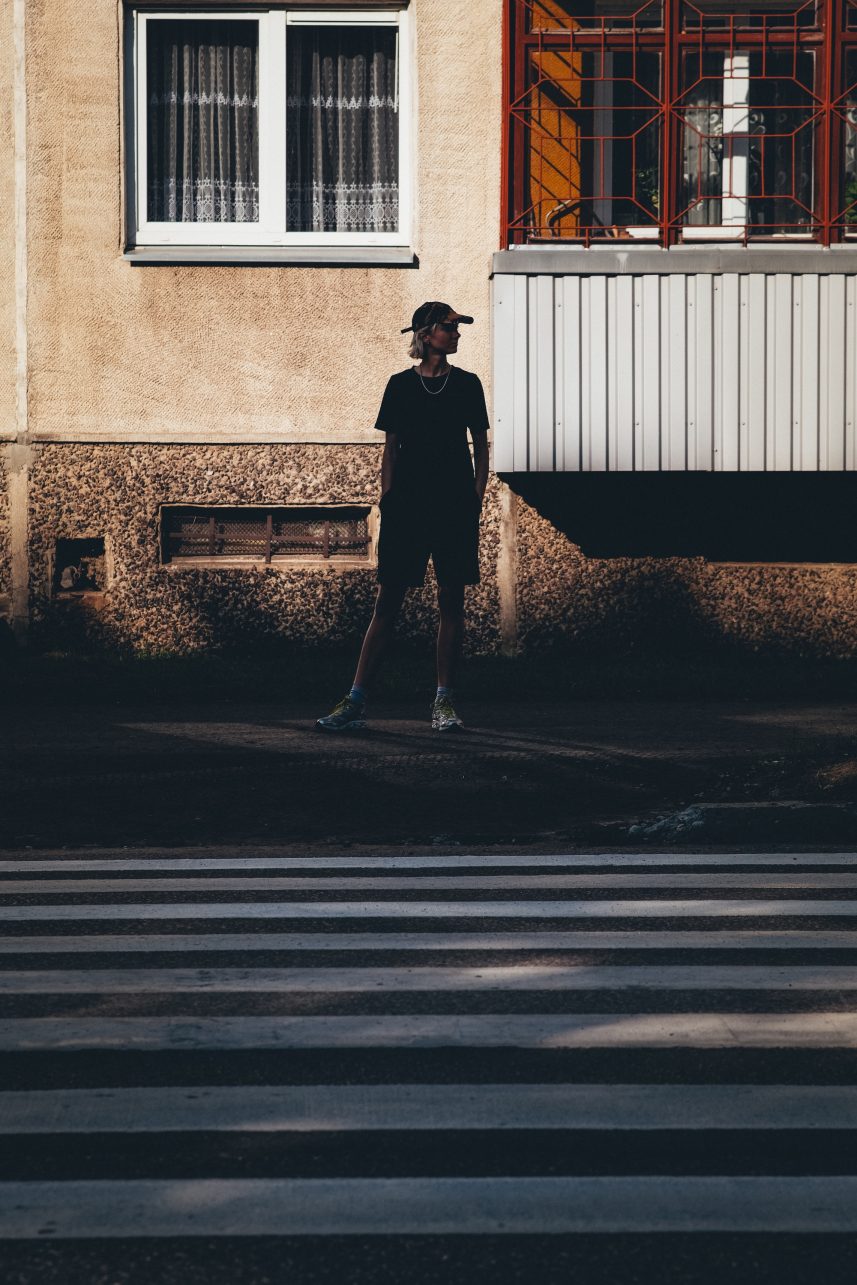
Did you have any favorite cafes or similar places in Vilijampolė?
I always liked the Alkava bakery on Varnių Street, and I also remember the name of the bar Juodvarniai. It was a place for meetings and happenings. Everybody used to go there to buy something, to do something. We used to go up the steps leading up Milikoniai Hill to Šilainiai, to the panorama. My grandfather used to say, “Let’s go to the horses.” In my teenage years, we used to drink cider on those steps, it was quite a remote place.
Was your decision to apply to a high school located in the city center an expression of a desire to escape Vilijampolė?
Yes, because it scared me how people here moved in very narrow trajectories. A person would live on one side of the street for 18 years and then move to the other side. Or they’d go to school, and after graduating, get a job at a store 10 meters away. When someone talked about going to America or England, it sounded like a fairy tale, an unattainable dream, because that kind of thing didn’t happen in my environment.
When I was maybe fifteen, my friend and I went to Šventoji for the Satta Outside festival. I was this girly girl from the hood and there were people with shaved heads, piercings, tattoos, incredible music… I saw that there were different possibilities in life. I came back, found friends in Kaunas city center, and started hanging out with people from the art world and going to Terra X parties. By the way, those were held right next to Saulės Gymnasium.
I also liked the stairs – once again stairs – that go from Saulės Gymnasium to the city center. When you reach the bottom of the stairs, you find yourself in the courtyard of the War Museum. One friend of mine lived on Laisvės Avenue. We were maybe 16 years old when we organized a Gopnik-themed party. Everyone came wearing Adidas tracksuits, with toy guns, made fake black eyes, and then went to a bar on Šv. Gertrūdos Street.
And then you left for Vilnius?
I started taking photos while still living in Kaunas and used to travel to Vilnius to work. Then I enrolled in journalism at Vilnius University, but then I ended up at the Lithuanian Academy of Music and Theater, where I graduated in film directing.
What did you want to be when you grew up?
I didn’t have a specific dream but on Christmas Eve, we used to do this spell: you write your professions on slips of paper, fold them, put them in a bag, and stuff them under your pillow. On Christmas morning you pull one out and find out what you’re going to be. I usually pulled out a dentist… I had made peace with this information, thinking that it would come true.
As a teenager, I thought I wanted to write, but journalism wasn’t exactly the right choice. It was not the kind of writing I wanted. Once you start studying, every attempt to give your opinion is rejected, and you have to acquire different competencies. And I was looking for a way to get closer to people through shared experiences. I mean, it wasn’t easy for me to build relationships, but when I started to be interested in music, in art, it turned out that such a human dialogue was possible.
Do you feel nostalgic about the time when you were a child?
Of course. Especially while creating Toxic, those feelings became even stronger. I revisited certain situations quite thoroughly and deeply. Analyzing the past helped me uncover deeply buried memories that are truly very precious to me. At the same time, I realized that things will never be the way they once were. The things that were important back then, that stirred emotions, no longer seem interesting now. For example, the feeling of smoking a cigarette for the first time, knowing you’re not supposed to, and that it would be really bad if your parents found out. That thrill of doing something you’re not supposed to gives you a rush of adrenaline. During the process of making Toxic, I started to feel nostalgic for those “first times,” which will never happen again.
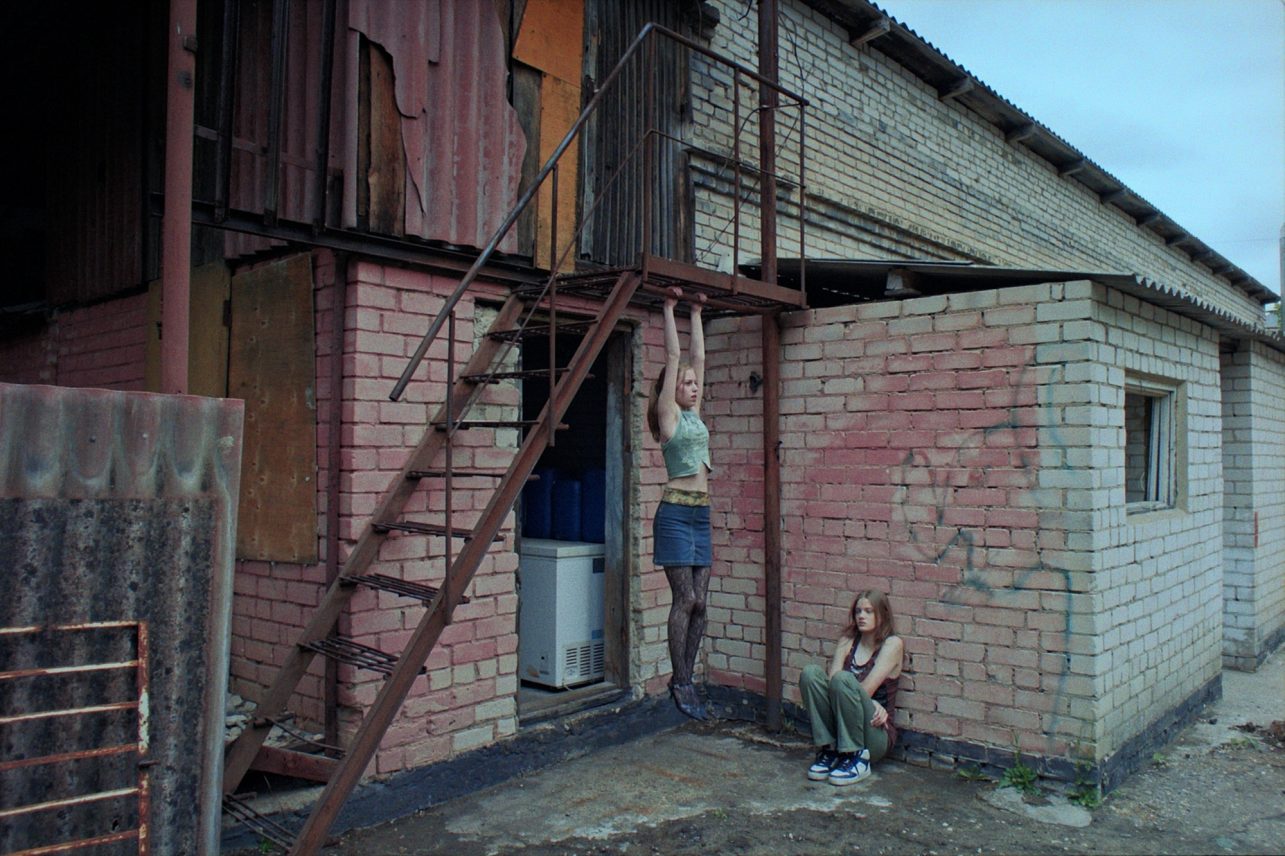
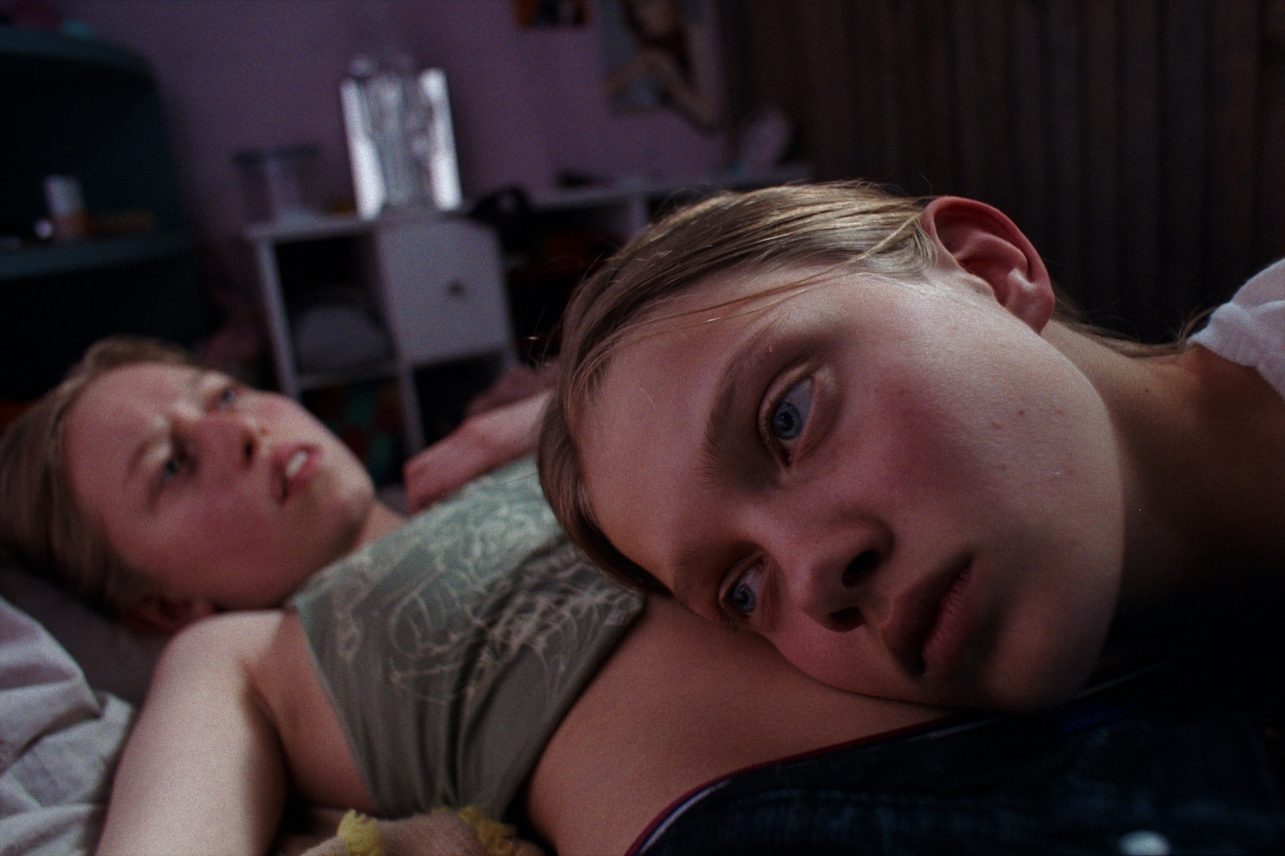
How much of you and your teenage years in Vilijampolė can be found in Toxic? At the beginning of the film, the main character has her jeans stolen, then she strangely befriends her abuser, and they go through the dystopian world that is so unforgiving for teenage girls together.
Yes, I had my jeans stolen too, right here [points with her hand] in Vilija pool. I was 12 years old. I remember coming to the dressing room, I hadn’t locked the locker, and… my jeans were gone. It was very scary and embarrassing to tell anyone. I didn’t have a mobile phone. I sat in the locker room until the coach came and let me call my grandmother from her office. Then my grandmother brought me pants… Later, I saw a girl walking around in those jeans of mine, and I got very angry, and my mother went up to her and told her to give me the pants back. Finally, the jeans, washed and folded, were put at the door of our flat.
Toxic has very interesting filming locations, their colors, rust, and crumbling walls. It all looks abandoned but also charming. You can definitely see something similar here in Vilijampolė. Will you give away where you filmed (it’s necessary to mention that the director of photography is Vytautas Katkus)?
In Naujoji Vilnia and Petrašiūnai. I found the right yard accidentally while driving around. Another location is near the highway, next to the cogeneration plant. When we were coming from Vilnius to film, the crew used to joke, “You have to make a turn at the chimney.”
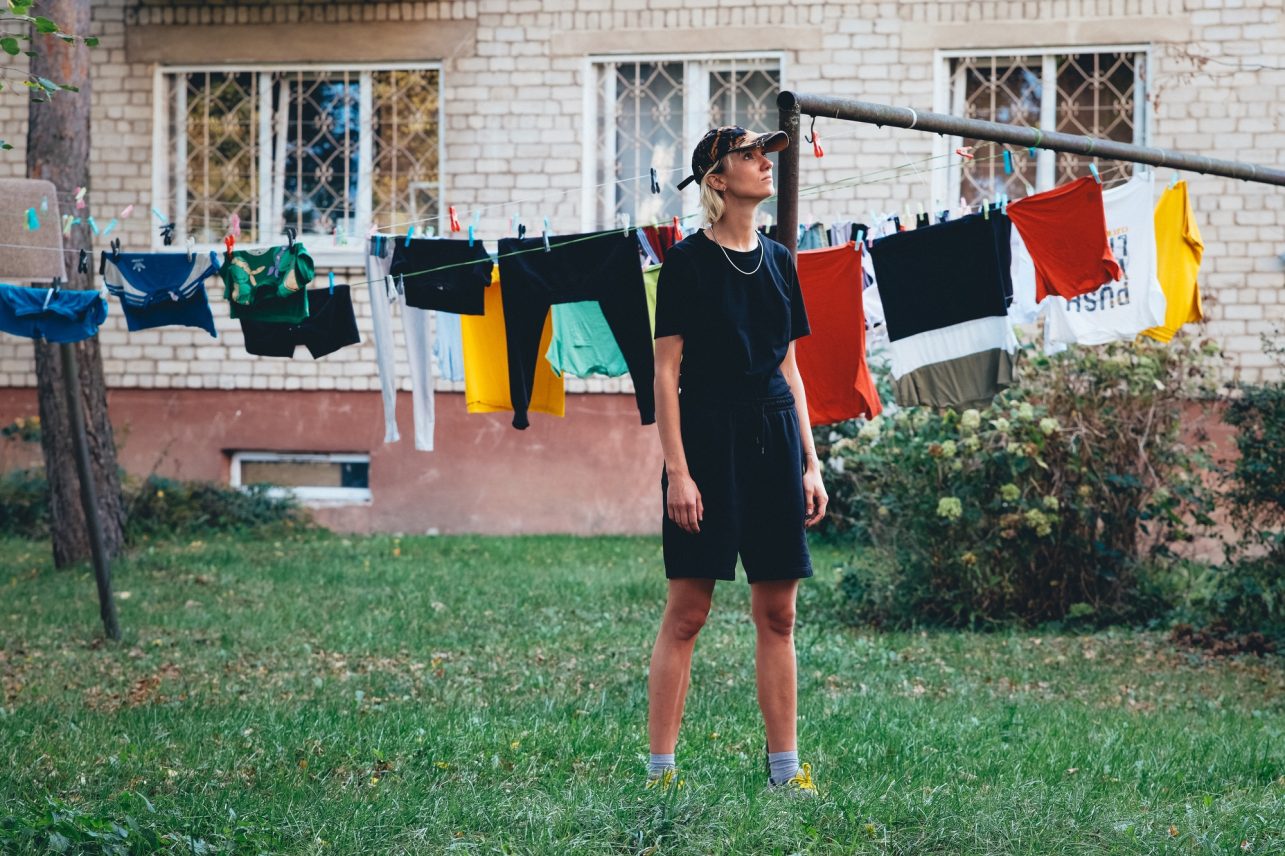
Do you trust the authenticity of your memories?
I remember my adolescence quite well. Childhood… well, yes, that mostly consists of imagery. I remember specific details that are sometimes interesting to use to make up for what is missing. But I don’t push myself to remember exactly, the margin of error is a cool thing.
For one scene I used a true story of a friend and I going to meet the boys at the Lampėdžiai quarry, a place then called “galekas” (the edge). We told our parents that we were going to spend the night at each other’s place. And those boys, as it seems now, were absolutely terrible. After some time, I saw them on the police reality show, handcuffed. Sounds bad? But I think it was an adventure; it didn’t seem unsafe at the time. There was much less anxiety at that age, and I always managed to get out of any situation successfully.
For me, Toxic is the least moralizing coming-of-age film I’ve ever seen. What is not encouraged in real life is aestheticized in the film. How universal is this? How was this aesthetic perceived by, for example, the audience in Locarno?
Some people interpreted the film as poverty porn, but I don’t agree with that. I definitely didn’t want to preach, but, as I’ve said, all those terrible stories have light and hope in them. I’m very curious to see how Lithuanians will receive the film. Maybe some mothers will look at it more sensitively, even though they behaved in a similar way once. Childhood adventures no longer seem acceptable to adults. But remember how you felt then. It was fun, wasn’t it?
People tend to adapt memories to a new self.
Probably so. That’s why I’m interested in making cinema – I’m not responsible for objective truth here. I don’t care if it was real, and I’m a bit tired of being asked if the story of Toxic is real. Sometimes people express sympathy for me having gone through all that. But the film is not about finding sympathy, it’s about finding strength in difficult situations, finding a way out.

